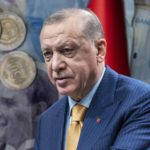Levent Gultekin, a journalist and friend of mine, was recently beaten up by a mob of 15 to 20 people outside an opposition television station in Istanbul where he has a regular talk show. This in itself is not so shocking, as quite a few vigilante attacks on dissident journalists have taken place in recent years. What makes the attack on Gultekin more of a dark comedy is the fact that it occurred the same week Turkish President Recep Tayyip Erdogan unveiled his new human rights action plan.
Turkey’s human rights record has gravely deteriorated under Erdogan’s watch. The government’s new plan seems to be in anticipation of a tough line from President Biden’s administration on Turkey’s failing democracy — and in line with Ankara’s recent charm offensive toward Europe. But the country does not need new legislation or a plan: It can simply honor its own constitution and stop using courts to penalize the government’s opponents.
What is clear is that Erdogan wants to mend fences with the West and start on good terms with the Biden administration. It’s also clear that he fears that a return to democracy would jeopardize his chances of staying in power forever.
Once upon a time, Turkey was a poster child for a Muslim country building a liberal democracy, and Erdogan’s Justice and Development Party had taken great strides in improving human rights standards by advancing toward European Union membership. But over the past decade, Turkey has incrementally become more authoritarian, emerging as a symbol of democracy’s global retreat. As a NATO ally, it thus represents a critical piece of the Biden administration’s declared goal to reverse the authoritarian tide across the world.
After four years of utter disregard for global democratic standards, does the United States have the capacity to make a difference in Turkey’s democracy? And if so, what is the right balance between engagement and criticism?
The starting point for the Biden administration should be consistently declaring its core principles and not being shy about publicly calling for an end to specific abuses. This is not as simple as it sounds, because Erdogan’s government responds fiercely to criticism, anti-Americanism is rampant and relations with Ankara are already delicate. At the end of the day, the U.S. government is not a human rights organization. In a world of fierce geopolitical competition, it has overarching strategic concerns — such as cajoling Turkey away from Russia or to a compromise on Syrian Kurds — that often end up pushing human rights back on its list of priorities. What matters is consistency, not just in Turkey but across the Middle East, and some discipline for policymakers to remain principled.AD
For four years under President Donald Trump, the State Department did not say much about violations in Turkey, and the U.S. Embassy in Ankara largely remained reticent, even when its own employees were detained by the Turkish government. The Biden administration started off with statements criticizing the imprisonment of Turkey’s leading civil society leader, Osman Kavala, and the recent detention of Bogazici University students for protesting Erdogan’s pick for a dean. That’s good.
But statements alone are just virtue signaling and can easily be ignored. Washington also needs to instruct its diplomats to uphold the long-standing U.S. tradition of engagement with a cross-section of the country, including minorities, opposition parties, local governments and civil society — something U.S. officials failed to do over the past few years. Inviting Turkey’s elected mayors and civil society or human rights activists to a planned global democracy summit later in the year would also send the right signal.
Enlisting European support in promoting democracy in Turkey is critical. Europeans remain worried about the United States’ ability to resuscitate the liberal order and are willing to strike transactional deals with difficult regimes. Exhausted by years of tension with Erdogan, they crave a stable, pragmatic relationship with Turkey — with or without democracy.AD
But the European Union has leverage that the United States lacks: It is Turkey’s top trading partner and structurally tied to Turkey through Turkey’s bid to join the E.U. In coordination with the Biden administration, Europe could use that leverage to at least try to persuade Erdogan to honor European Court of Human Rights decisions, such as the verdict for the release of Kavala or imprisoned Kurdish politician Selahattin Demirtas. Focusing on a few symbolic cases and trading economic incentives for improvement on human rights makes more sense than simply issuing self-righteous reports on abuses.
The transatlantic focus on Turkey’s democracy would also play an important role in preventing further government meddling in the electoral system — still relatively intact and a source of legitimacy in Turkish politics.
But in the end, only Turks can reverse Turkey’s authoritarian lurch. What I have realized watching Turkey’s despotic drift from inside the country is that Turkey’s civil society is far more resilient than outsiders understand. My friend Levent had his fingers broken during the attack but immediately went on television for an hour to tell his story. There are countless daily examples of democratic resistance.AD
This story is not just about Turkey. Our predicament also depends on whether democracy can globally survive. But for now, all we need from the outside world is for our democratic partners to remain true to their own principles.
Source: Washington Post



